Lions For Lambs is an ambitious piece, betting too much of its money on legendary acts.
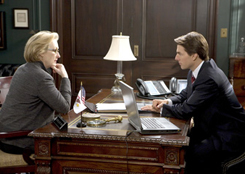 It’s not difficult to imagine how the film came about. Writer, Matthew Michael Carnahan, is struck by the desire to pen down his thoughts about the American war with Afghanistan. He’s then inspired to transform it into his 1st feature film screenplay. To ensure that his views are heard, he persuades household names, Meryl Streep and Tom Cruise, to play the key roles he’scrafted and Robert Redford to not only star in the film, but to direct and co-produce it as well.
It’s not difficult to imagine how the film came about. Writer, Matthew Michael Carnahan, is struck by the desire to pen down his thoughts about the American war with Afghanistan. He’s then inspired to transform it into his 1st feature film screenplay. To ensure that his views are heard, he persuades household names, Meryl Streep and Tom Cruise, to play the key roles he’scrafted and Robert Redford to not only star in the film, but to direct and co-produce it as well.
Roping in such a class of powerhouse acts was an intelligent marketing scheme for the film. But like any film, when the plot and content that defines the story presents a definite failing formula, even the best of actors in this generation may not be able to save and add enough substance to the film for it to survive. That’s the case for Lions For Lambs.
The Potentially Riveting Plot
Janine Roth (Streep), a journalist of 40 years, 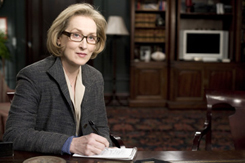 has landed herself a coveted hour-long interview with brash White House hopeful Senator Jasper Irving (Cruise), during which he throws on her an exclusive – a new labour intensive and costly strategy to win the war; a strategy that started “10 minutes ago” as they began the interview, and a strategy he’s confident will bring the country the victory they’ve been waiting for (and that would secure his position in the White House).
has landed herself a coveted hour-long interview with brash White House hopeful Senator Jasper Irving (Cruise), during which he throws on her an exclusive – a new labour intensive and costly strategy to win the war; a strategy that started “10 minutes ago” as they began the interview, and a strategy he’s confident will bring the country the victory they’ve been waiting for (and that would secure his position in the White House).
Over at Afghanistan, 2 American student-turned-soldiers, Arian (Derek Luke) and Ernest (Michael Peña), find themselves trapped and semi-frozen in the blistering cold. As they wait for the military rescue team to arrive, they’re posed with the threat of dozens of Afghan soldiers.
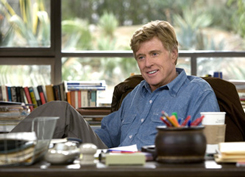 At the same time, in California, Professor Stephen Malley (Redford), who once taught Arian and Ernest, talks about them to his jaded student, Todd (Andrew Garfield), in a bit to convince him to take more control of his life.
At the same time, in California, Professor Stephen Malley (Redford), who once taught Arian and Ernest, talks about them to his jaded student, Todd (Andrew Garfield), in a bit to convince him to take more control of his life.
In the introductory scenes, the characters and plot that Carnahan builds instills a sense of anticipation for something strong and powerful and hopefully a fresh perspective to the much and deeply talked-about nation and war. In fact, there’
s much about an idealistic and possibly unrealistic senator, as well as a journalist torn between what she believes to be ridiculousness and her obligation towards a newswire, and the vast difference between the 2 characters, that suggests a potentially groundbreaking film. Link that with the 2 supporting stories, which are potentially captivating by themselves, and a promising cinematic experience is developed.
The Stale Bits and Pieces
As the film progresses, however, the 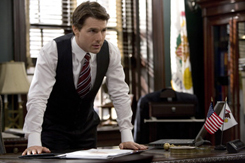 thread that weaves the 3 stories together frays and the film starts to fall apart. The conversation between Roth and Irving heats up, but the content of it presents nothing new for the public to think about than what’s been said in reality –on one side, an attack on the hypocrisy of politics and the accusation on the American government for lying to the public, and on the other side, false reasons for war, ridiculous points of justification to try harder for a win and the placing of blame on the media for sensationalising the war and giving it a negative image.
thread that weaves the 3 stories together frays and the film starts to fall apart. The conversation between Roth and Irving heats up, but the content of it presents nothing new for the public to think about than what’s been said in reality –on one side, an attack on the hypocrisy of politics and the accusation on the American government for lying to the public, and on the other side, false reasons for war, ridiculous points of justification to try harder for a win and the placing of blame on the media for sensationalising the war and giving it a negative image.
In this situation, Cruise and Streep, who play off each others’ performance quite smoothly and bring justice to their respective characters (Cruise as the naïve, ignorant leader and Streep as the opinionated journalist and pragmatic citizen), rescue the scenes in this story and make them possible to watch and, at certain points, enjoy.
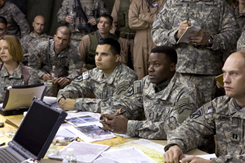 But this overpowers the absolutely mundane discussions that Redford has with Garfield as they throw at each other cliché hypothetical situations to justify their respective stands. The Afghanistan story also becomes meaningless with its failure to bring about the sense of patriotism that the 2 soldier-characters were designed to exude. It’s as if the parts of the film that really matters to Carnahan (and through which he brings across his views) are the Cruise-Streep scenes and that he crafted the professor and Afghanistan stories purely to make the film seem less biased and longer than what it would have been if Streep and Cruise’s lines ruled the script.
But this overpowers the absolutely mundane discussions that Redford has with Garfield as they throw at each other cliché hypothetical situations to justify their respective stands. The Afghanistan story also becomes meaningless with its failure to bring about the sense of patriotism that the 2 soldier-characters were designed to exude. It’s as if the parts of the film that really matters to Carnahan (and through which he brings across his views) are the Cruise-Streep scenes and that he crafted the professor and Afghanistan stories purely to make the film seem less biased and longer than what it would have been if Streep and Cruise’s lines ruled the script.
Back To Political Science Class
Lions For Lambs feels more like a lecture than a cinematic  experience with its endless, heavy discussions about the American political standards and debates between journalist and senator regarding what the country really needs. As Carnahan brings across his views through the lengthy dialogue, the film comes through as a biased piece that has propaganda splashed all over it. There’s a constant hope for a climatic follow-up to each story, but it never comes.
experience with its endless, heavy discussions about the American political standards and debates between journalist and senator regarding what the country really needs. As Carnahan brings across his views through the lengthy dialogue, the film comes through as a biased piece that has propaganda splashed all over it. There’s a constant hope for a climatic follow-up to each story, but it never comes.
It is a painful experience to walk out of the theatre, knowing that an extra half-an-hour’s worth would have made a world of a difference to the 90-minute film’s quality. Stories are left hanging, approaches to the subject matter are incomplete and no sense of proper closure to the stories is established. It’s evident Carnahan got too caught up in his objective to have his views seen and heard, he left behind his role as a filmmaker.
Powerhouse Acts Turned Powerless
Redford’s direction was smart and insightful, giving us plenty of perspectives and angles to modulate the monotony of the arguments.
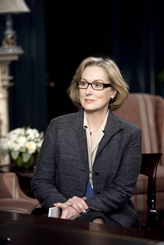 On screen, however, both Redford and Cruise have given better performances. Perhaps it’s the string of insensate events that prevents them from breaking away from their dry portrayals. But Cruise’s style of acting and the method he adopts seem too familiar on the actor and is reminiscent of a less interesting version of his Jerry Maguire and A Few Good Men roles. Redford dulls audiences as much as he did in Spy Game, in which the actor also sits for most of the film and talks.
On screen, however, both Redford and Cruise have given better performances. Perhaps it’s the string of insensate events that prevents them from breaking away from their dry portrayals. But Cruise’s style of acting and the method he adopts seem too familiar on the actor and is reminiscent of a less interesting version of his Jerry Maguire and A Few Good Men roles. Redford dulls audiences as much as he did in Spy Game, in which the actor also sits for most of the film and talks.
If there was one element that saved the film, it was Streep’s performance. The 2-time Oscar winner may have brought about much disappointment with her recent roles in Evening and Rendition, in which she seems to have toned down her performance as compared to her normal portrayals. But in Lions For Lambs, her versatility shines through as she brilliantly and tactfully plays with Roth’s dilemma and the psychological struggle that is associated with it.
Rating: 3 out of 5 stars
Movie Details:
Opens: Nov 8
Running Time: 90 mins
Language: English
Cast: Meryl Streep, Tom Cruise, Robert Redford
Director: Robert Redford

